
The Pure in Heart
Blessed are the pure in heart: for they shall see God.
|
This verse, Matthew 5:8, from the Sermon on the Mount, is generally believed to have been taken from Psalm 24:3–5
either by Jesus or the author of Matthew who was adding this verse that is not found in Luke.
A number of scholars have been certain that there were originally seven Beatitudes, as seven was a holy number.
Since this verse is so similar to the Psalm some believe it was the one incorrectly integrated into the Sermon on the Mount...
The form – "blessed" (Greek: makarios) + subject + "that" (hoti) + cause – can be found in Genesis 30:13,
whereas the eschatological orientation is similar to Daniel 12:12.
The Greek word makarios cannot adequately be rendered as "blessed" nor "happy,"
as it is rather a term of congratulation and recommendation, that can also mean "satisfied" (as in Psalm 1:1).
The word purity is not believed to refer to one who was ritually cleansed, but rather to internal spiritual purity as noted by the "in heart" addition.
At the time the heart was literally seen as the seat of emotion and the soul, though today the verse is read metaphorically. (Wikipedia)
|
Article 2 in a series

Purity of Heart and Motive
God initiated circumcision with Abraham and the men of his camp.
But there is an implied counterpart for women: purity of heart and motive!
"Blessed are the pure in heart: for they shall see God."
Circumcision is a guy thing. It signifies a life of godly behavior, godly actions.
There is a counter part given to us in the Law of Moses, for women: it's purity of heart!
Motives matter as much as actions for men and for women alike!
Wholeness applies to both sexes!
In marriage, both man and wife are called to holiness.
Over and over again God probes the inner man, the real person. His discerning eyes won’t allow us to hide behind social facades, adopted mannerisms or walls of materialism. Before God each man is seen just as he is. His innermost thoughts, thoughts he may wish to hide from the world, are exposed by the light of God.
God requires us to keep all His statutes and laws, and yet which one of us can possibly keep all of them all the days of our lives?
The prophet writes: “For all of us have become like one who is unclean, and all our righteous deeds are like a filthy garment; and all of us wither like a leaf, and our iniquities, like the wind, take us away.” (Isaiah 64:6) On one hand God tells us to keep all His statutes. On the other the prophet recognizes the human condition: we all fall short of perfection and therefore cannot possibly keep all the Law all the time.
Yet, as we read in Deuteronomy 30:6, God does not expect us to circumcise our own hearts. He says He will do that. But how? And what does He expect from us? Look at Leviticus 26:40-42:
“If they confess their iniquity and the iniquity of their forefathers, in their unfaithfulness which they committed against Me, and also in their acting with hostility against Me—
I also was acting with hostility against them, to bring them into the land of their enemies—or if their uncircumcised heart becomes humbled so that they then make amends for their iniquity,
Then I will remember My covenant with Jacob, and I will remember also My covenant with Isaac, and My covenant with Abraham as well, and I will remember the land.”

Let me tell you, few things can mess you up as badly as trying to do your best. For the tender heart, the earnest heart, it is so discouraging to give all you have trying to do what you think Jesus would have you do, and find yourself falling short, sabotaging your own efforts at every turn. Discouragement and shame settle in like a long Seattle rain.
And this is what most Christians experience as the Christian life. Try harder; feel worse.
I spoke of cunning traps that replace the simple priority of loving Jesus. Here is a very surprising one — the trap of integrity. What I mean by this is when our attention turns to maintaining personal righteousness. This seems noble and right. Jesus told us to keep his commands. But this can be a trap because most Christians interpret this as “Try harder; do your best.”
I find myself slipping back into this weekly. A handful of symptoms tip me off. Exhaustion, for one. I’ll just find myself wrung out again. Or an unnamed internal distress; my insides all twisted up. Discouragement, that old nagging cloud of “I’m totally blowing it” back over me. Irritation with needy people. These symptoms — and a host of others — are the collateral damage that results from trying my best. They let me know I’ve fallen back to thinking that to love Jesus is to give my very best in living for him. And this is a sticky business. Because on the one hand, that’s true — to love him is to obey. But out of what resources? From what fountain of inner strength?
I thought it was my faithfulness. My integrity. A willingness to sacrifice, to fight well. And of course we are involved; of course our choices matter. But didn’t Jesus warn, “Apart from me you can do nothing” (John 15:5)? The good news is this — you were never meant to imitate Christ. Not if by that you mean doing your best to live as he did. It ought to come as a great relief. Something inside me says, Well — that’s certainly been my experience. But without understanding that I was never meant to ”do my best”, I feel awful about it.
In a biography of Christ which is good in many aspects, I ran across this terrible snare. The author describes the mission of Jesus as,
a spiritual revolution, the replacement of the unreformed law of Moses by a New Testament based on love and neighborliness, which could be embraced by all classes and all peoples. ... Life on earth was to be devoted to a self-transformation in which each human soul strove to become as like God as possible, a process made easier by the existence of his son made man, thus facilitating imitation.
It is an evil and crippling distortion. Jesus didn’t start the Peace Corps. The secret of Christianity is something else altogether — the life of Christ in you. Allowing his life to become your life. His revolution is not self-transformation, but his transformation of us, from the inside out, as we receive his life and allow him to live through us. Vine, branch. Anything else is madness.

|
|
|
|
|
|
|

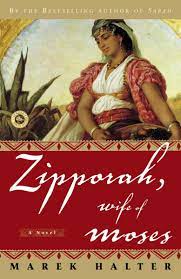
Zipporah: Reminding Us Who We Are

By Rev. Dr. Denise Kingdom Grier
Zipporah was Moses’s first wife in the Bible.
Her story reminds us that flesh and blood have always been faithful reminders of God’s covenant promises.
This article is part of the She Is Called Women of the Bible Study Series
Prayer
Great I Am, light the path before us we pray. Remind us in you who we truly are and remind your church of the same. Amen.
Who Was Zipporah in the Bible?
Zipporah the Midianite was a descendant of Midian, Abraham’s son by his third wife Keturah. In Hebrew, her name means “bird” or “little bird.” We first meet Zipporah—who later became Moses’s wife—at a well in her hometown of Midian. At the well, she met Moses, who was fleeing from Egypt and from Pharaoh’s judgment after he murdered an Egyptian (Exodus 2:15-22).
Zipporah and her six sisters were attending to their daily chores of drawing water and watering their father’s flock. Moses was seated at the well nearby, no doubt dressed, painted, and speaking like an Egyptian dignitary. When local shepherds drove the sisters away from the well in an act of gender-based violence, Moses rose to their defense and he watered their father’s flocks. Upon returning to the home of their father, the sisters reported the incident of the “Egyptian” stranger who had come to their aid. In gratitude, the father urged them to go back and bring the kind “Egyptian” Moses to their village, and soon after, Zipporah would become Moses’s wife.
Zipporah only appears three times in Scripture: the first time at the well (Exodus 2), the second time while on the journey to Egypt (Exodus 4), and finally in the wilderness when Moses met her father Jethro who was accompanied by Zipporah and her sons (Exodus 18). Of her three appearances in the text, she only speaks one time, in Exodus 4. Ultimately, Zipporah is replaced by Moses’s second wife, a Cushite woman.
Digging Deeper
The long donkey ride on the way to Egypt left Zipporah, Moses, and their two children wanting for a good night’s rest. During the night, God’s hand of death came against Moses and “tried to kill him” (Exodus 4:24).
Wait. What? God had just given Moses an assignment to return to Egypt and demand that Pharaoh free the Hebrews from bondage. What’s more, God had just revealed himself to Moses and demonstrated great power in and through him. Why would God want to kill Moses?
Whatever the reason, Zipporah had to think and act quickly in order to save her husband’s life. Her response to her husband’s impending death is to perform a circumcision on her son and toss the foreskin at her husband Moses. In order to understand this scene, some background information is in order.
Let’s go back.
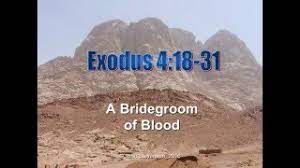 When Zipporah and her sisters spotted Moses the first time, they thought he was an Egyptian, and in many ways they were right. Moses had been in the household of Pharaoh in Egypt since infancy. His mannerisms and customs were shaped by his Egyptian upbringing. In fact, he most likely dreamt in the language of Pharaoh. Everything about him was Egyptian, except for one thing. Unlike his Egyptian peers, he was circumcised. Circumcision was not the same medical practice it is today, but circumcision was a sign of the covenant God had made with Abraham and his descendants. Zipporah had borne two sons to Moses, but he had failed to perform circumcision on his sons. Egypt had caused Moses to forget his roots—his identity—as a descendant of Abraham. Alas, he had forgotten his blood!
When Zipporah and her sisters spotted Moses the first time, they thought he was an Egyptian, and in many ways they were right. Moses had been in the household of Pharaoh in Egypt since infancy. His mannerisms and customs were shaped by his Egyptian upbringing. In fact, he most likely dreamt in the language of Pharaoh. Everything about him was Egyptian, except for one thing. Unlike his Egyptian peers, he was circumcised. Circumcision was not the same medical practice it is today, but circumcision was a sign of the covenant God had made with Abraham and his descendants. Zipporah had borne two sons to Moses, but he had failed to perform circumcision on his sons. Egypt had caused Moses to forget his roots—his identity—as a descendant of Abraham. Alas, he had forgotten his blood!
When Zipporah saw her husband dying before her eyes at the hand of the Lord, she made a split second decision to circumcise her son and throw his foreskin at the feet of her husband. This has to be the bloodiest scene in the book of Exodus since the massacre of Hebrew male children in chapter 1. It would be rivaled soon after as the blood of the Egyptian children ran cold at the final plague, as the blood of lambs was smeared on the door posts of the Hebrew households that first Passover, and with the bloodying of the sea as the waters closed over the Egyptian army.
“You are a bridegroom of blood,” Zipporah declares as she tosses flesh at Moses’s feet. With the prowess of The Lion King’s Mufasa to his son, Simba, Zipporah’s actions roar, “Remember who you are.” You, Moses, are of the bloodline of Abraham. As such, you should have circumcised your son soon after his birth. Remember who you are; you are a bridegroom of blood. The trappings of Pharaoh’s house made it easy for Moses to forget Abel’s sacrifice, the ram who saved Isaac, and the Hebrew blood that ran through his veins. These people he was going to save were his own people, God’s chosen people by blood.
In order to complete his assignment, Moses had to die. At least, the Egyptian in him had to die in order for the “bloody,” Israelite Moses, in his truest identity, to fulfill the purpose for which he was born. Through Zipporah’s quick-thinking actions, she evoked the covenant by demonstration so Moses would remember his roots. If he was going to Egypt to free his people, his identification with Egypt had to die. The flesh and blood in the hands of his wife Zipporah would not let Moses forget.
She Is Called and We Are Called
The church is married to a bridegroom of blood. Christmas warns us that flesh and blood matter to God. Holy Week drags us reluctantly down the bloody path to Golgotha. Maundy Thursday leads us to a bloody table and to a garden where Judas Iscariot has blood on his hands. Blood and water flow from the side of the bridegroom in those last moments on the cross. After the resurrection, Jesus invited Thomas to touch him in the bloody parts, his hand and his side. We who are in Christ cannot deny the sacrifice, the pain, the very life that runs through our souls in the blood of Christ, our resurrected Lord.
We must remember who we are—bride of Christ, circumcised in our hearts, dead to sin, our flesh perpetually cast at the feet of Jesus in confession and repentance. That’s who we are: dead because of our sins and alive because of Christ, through his life and by his blood.
Zipporah reaches across centuries to point to the Lord ’s Table, the flesh and blood of the new covenant. Every time we gather for communion, her words should be told alongside Moses’s, “Yes, Jesus, you are a Bridegroom of blood.”
At first glance, the relationship between Zipporah and Moses looks like the familiar boy-rescues-girl tale. Zipporah and her sisters appear too weak to defend themselves from the threat of local shepherds at the well. And, here comes Moses to the rescue. Naturally, this man who rescued these vulnerable young women was a likely suitor for one of the daughters of the Priest of Midian, and they lived happily ever after.
Alas, this is no patriarchal fairy tale, and Zipporah is no damsel in distress. Where once she was the beneficiary of male benevolence, she then stepped in to save the life of the patriarch. Zipporah’s story should always be told alongside Moses’s, for without her, he would surely have died before returning to Egypt, still unclear about his true identity.
Conclusion
There are things in the culture, in society, and in this world that naturally attach themselves to us and disguise our true identity. Sometimes it’s our careers, our family name, or our traditions that are such a part of us that we forget Paul’s reminder that “our citizenship is in heaven” (Philippians 3:20), and our identity is hidden in Christ.
As we reflect on Zipporah’s witness, let us consider this:
The Hebrew word for “remember” invites us to focus on a thing until it leads us to repentance. Ask God to help you remember the places and things in your life that you have attached to your identity. How might these things have been allowed to trump your identity in Christ? Ask God to reveal these places and/or things. Confess and repent.
Zipporah urges us to remember who we are in Christ. We are urged to die to all our false identities and to remember our true identity as siblings of the flesh and blood of the Bridegroom.


Circumcision Confirmed with King David 1000 years after Abraham
David lived a thousand years after Abraham, about 1000 BC at which time the descendants of Abraham observed circumcision as codified in the Law of Moses 500 years earlier.
An entire generation of Jews died in the wilderness because of their failure to take God seriously. They also had not bothered to circumcise their sons. Arriving forty years later about to enter the promised land at last, all the boys and young men had to be circumcised at Gilgal:
So it was, when all the kings of the Amorites who were on the west side of the Jordan, and all the kings of the Canaanites who whereby the sea, heard that the LORD had dried up the waters of the Jordan from before the children of Israel until we had crossed over, that their heart melted; and there was no spirit in them any longer because of the children of Israel.
At that time the LORD said to Joshua, “Make flint knives for yourself, and circumcise the sons of Israel again the second time.”
So Joshua made flint knives for himself, and circumcised the sons of Israel at the hill of the foreskins.
And this is the reason why Joshua circumcised them: All the people who came out of Egypt who were males, all the men of war, had died in the wilderness on the way, after they had come out of Egypt.
For all the people who came out had been circumcised, but all the people born in the wilderness, on the way as they came out of Egypt, had not been circumcised.
For the children of Israel walked forty years in the wilderness, till all the people who were men of war, who came out of Egypt, were consumed, because they did not obey the voice of the LORD—to whom the LORD swore that He would not show them the land which the Lord had sworn to their fathers that He would give us, “a land flowing with milk and honey.”
Then Joshua circumcised their sons whom He raised up in their place; for they were uncircumcised, because they had not been circumcised on the way.
So it was, when they had finished circumcising all the people, that they stayed in their places in the camp till they were healed.
Then the LORD said to Joshua, “This day I have rolled away the reproach of Egypt from you.” Therefore the name of the place is called Gilgal to this day.
Now the children of Israel camped in Gilgal, and kept the Passover on the fourteenth day of the month at twilight on the plains of Jericho.
And they ate of the produce of the land on the day after the Passover, unleavened bread and parched grain, on the very same day.
Then the manna ceased on the day after they had eaten the produce of the land; and the children of Israel no longer had manna, but they ate the food of the land of Canaan that year.
(Joshua 5)
Circumcision was a serious matter in the Old Testament!

Circumcision in the New Testament
β. ἡ περιτομή ἀχειροποίητος, the extinction of the passions and the removal of spiritual impurity (see περιτέμνω, at the end), Colossians 2:11a; ἡ περιτομή καρδίας in Romans 2:29 denotes the same thing; περιτομή τοῦ Χριστοῦ, of which Christ is the author, Colossians 2:11b.
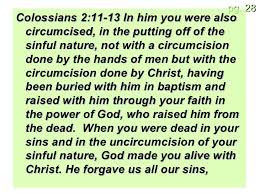 1. As you therefore have received Christ Jesus the Lord, so walk in Him,
rooted and built up in Him and established in the faith, as you have been taught, abounding in it with thanksgiving.
Beware lest anyone cheat you through philosophy and empty deceit, according to the tradition of men, according to the basic principles of the world, and not according to Christ.
For in Him dwells all the fullness of the Godhead bodily;
and you are complete in Him, who is the head of all principality and power.
In Him you were also circumcised with the circumcision made without hands, by putting off the body of the sins of the flesh, by the circumcision of Christ,
buried with Him in baptism, in which you also were raised with Him through faith in the working of God, who raised Him from the dead.
And you, being dead in your trespasses and the uncircumcision of your flesh, He has made alive together with Him, having forgiven you all trespasses,
having wiped out the handwriting of requirements that was against us, which was contrary to us. And He has taken it out of the way, having nailed it to the cross.
Having disarmed principalities and powers, He made a public spectacle of them, triumphing over them in it.
For this you know, that no fornicator, unclean person, nor covetous man, who is an idolater, has any inheritance in the kingdom of Christ and God.
Let no one deceive you with empty words, for because of these things the wrath of God comes upon the sons of disobedience.
Therefore do not be partakers with them. (Colossians 2:6-16)
1. As you therefore have received Christ Jesus the Lord, so walk in Him,
rooted and built up in Him and established in the faith, as you have been taught, abounding in it with thanksgiving.
Beware lest anyone cheat you through philosophy and empty deceit, according to the tradition of men, according to the basic principles of the world, and not according to Christ.
For in Him dwells all the fullness of the Godhead bodily;
and you are complete in Him, who is the head of all principality and power.
In Him you were also circumcised with the circumcision made without hands, by putting off the body of the sins of the flesh, by the circumcision of Christ,
buried with Him in baptism, in which you also were raised with Him through faith in the working of God, who raised Him from the dead.
And you, being dead in your trespasses and the uncircumcision of your flesh, He has made alive together with Him, having forgiven you all trespasses,
having wiped out the handwriting of requirements that was against us, which was contrary to us. And He has taken it out of the way, having nailed it to the cross.
Having disarmed principalities and powers, He made a public spectacle of them, triumphing over them in it.
For this you know, that no fornicator, unclean person, nor covetous man, who is an idolater, has any inheritance in the kingdom of Christ and God.
Let no one deceive you with empty words, for because of these things the wrath of God comes upon the sons of disobedience.
Therefore do not be partakers with them. (Colossians 2:6-16)
2. For circumcision is indeed profitable if you keep the law; but if you are a breaker of the law, your circumcision has become uncircumcision.
Therefore, if an uncircumcised man keeps the righteous requirements of the law, will not his uncircumcision be counted as circumcision?
And will not the physically uncircumcised, if he fulfills the law, judge you who, even with your written code and circumcision, are a transgressor of the law?
For he is not a Jew who is one outwardly, nor is circumcision that which is outward in the flesh;
but he is a Jew who is one inwardly; and circumcision is that of the heart, in the Spirit, not in the letter; whose praise is not from men but from God.
(Romans 2:25-29)
3. “As many as desire to make a good showing in the flesh, these would compel you to be circumcised, only that they may not suffer persecution for the cross of Christ.
For not even those who are circumcised keep the law, but they desire to have you circumcised that they may boast in your flesh.
But God forbid that I should boast except in the cross of our Lord Jesus Christ, by whom the world has been crucified to me, and I to the world.
For in Christ Jesus neither circumcision nor uncircumcision avails anything, but a new creation. And as many as walk according to this rule, peace and mercy be upon them, and upon the Israel of God.
From now on let no one trouble me, for I bear in my body the marks of the Lord Jesus.
Brethren, the grace of our Lord Jesus Christ be with your spirit. Amen.” (Galatians 6:12-19)

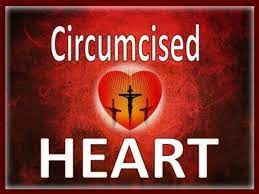 The idea of “circumcision of the heart” is found in Romans 2:29. It refers to having a pure heart, separated unto God. Paul writes, “A Jew is one inwardly, and circumcision is a matter of the heart, by the Spirit, not by the letter.” These words conclude a sometimes confusing passage of Scripture regarding circumcision and the Christian. Verses 25-29 provide context:
The idea of “circumcision of the heart” is found in Romans 2:29. It refers to having a pure heart, separated unto God. Paul writes, “A Jew is one inwardly, and circumcision is a matter of the heart, by the Spirit, not by the letter.” These words conclude a sometimes confusing passage of Scripture regarding circumcision and the Christian. Verses 25-29 provide context:
“For circumcision indeed is of value if you obey the law, but if you break the law, your circumcision becomes uncircumcision. So, if a man who is uncircumcised keeps the precepts of the law, will not his uncircumcision be regarded as circumcision? Then he who is physically uncircumcised but keeps the law will condemn you who have the written code and circumcision but break the law. For no one is a Jew who is merely one outwardly, nor is circumcision outward and physical. But a Jew is one inwardly, and circumcision is a matter of the heart, by the Spirit, not by the letter. His praise is not from man but from God.”
Paul is discussing the role of the Old Testament Law as it relates to Christianity. He argues that Jewish circumcision is only an outward sign of being set apart to God. However, if the heart is sinful, then physical circumcision is of no avail. A circumcised body and a sinful heart are at odds with each other. Rather than focus on external rites, Paul focuses on the condition of the heart. Using circumcision as a metaphor, he says that only the Holy Spirit can purify a heart and set us apart to God. Ultimately, circumcision cannot make a person right with God; the Law is not enough. A person’s heart must change. Paul calls this change “circumcision of the heart.”
This concept was not original with the apostle Paul. As a Jew trained in the Law of Moses, he was certainly aware of this discussion from Deuteronomy 30. There, the Lord used the same metaphor to communicate His desire for a holy people: “And the LORD your God will circumcise your heart and the heart of your offspring, so that you will love the LORD your God with all your heart and with all your soul, that you may live” (Deuteronomy 30:6). Physical circumcision was a sign of Israel’s covenant with God; circumcision of the heart, therefore, would indicate Israel’s being set apart to love God fully, inside and out.
John the Baptist warned the Pharisees against taking pride in their physical heritage and boasting in their circumcision: “Do not think you can say to yourselves, 'We have Abraham as our father.' I tell you that out of these stones God can raise up children for Abraham” (Matthew 3:9).
True “children of Abraham” are those who follow Abraham’s example of believing God (Genesis 15:6). Physical circumcision does not make one a child of God; faith does. Believers in Jesus Christ can truly say they are children of “Father Abraham.” “If you belong to Christ, then you are Abraham’s seed, and heirs according to the promise” (Galatians 3:29).
God has always wanted more from His people than just external conformity to a set of rules. He has always wanted them to possess a heart to love, know, and follow Him. That’s why God is not concerned with a circumcision of the flesh. Even in the Old Testament, God’s priority was a spiritual circumcision of the heart: “Circumcise yourselves to the LORD, circumcise your hearts, you men of Judah and people of Jerusalem, or my wrath will break out and burn like fire because of the evil you have done” (Jeremiah 4:4).
Both Testaments focus on the need for repentance and inward change in order to be right with God. In Jesus, the Law has been fulfilled (Matthew 5:17). Through Him, a person can be made right with God and receive eternal life (John 3:16; Ephesians 2:8-9). As Paul said, true circumcision is a matter of the heart, performed by the Spirit of God.
(Gotquestions.org: Questions about Romans)
The Apostle Paul closed his letter to the Galatians churches in what is now Turkey:
Do not be deceived, God is not mocked; for whatever a man sows, that he will also reap.
For he who sows to his flesh will of the flesh reap corruption, but he who sows to the Spirit will of the Spirit reap everlasting life.
And let us not grow weary while doing good, for in due season we shall reap if we do not lose heart.
Therefore, as we have opportunity, let us do good to all, especially to those who are of the household of faith.
See with what large letters I have written to you with my own hand!
As many as desire to make a good showing in the flesh, these would compel you to be circumcised, only that they may not suffer persecution for the cross of Christ.
For not even those who are circumcised keep the law, but they desire to have you circumcised that they may boast in your flesh.
But God forbid that I should boast except in the cross of our Lord Jesus Christ, by whom the world has been crucified to me, and I to the world.
For in Christ Jesus neither circumcision nor uncircumcision avails anything, but a new creation.
And as many as walk according to this rule, peace and mercy be upon them, and upon the Israel of God.
From now on let no one trouble me, for I bear in my body the marks of the Lord Jesus.
Brethren, the grace of our Lord Jesus Christ be with your spirit. Amen.
 Ray Stedman adds: "...The Apostle closes on one of the most personal notes in the whole New Testament. He says (verse 11):
See with what large letters I am writing to you with my own hand. (Galatians 6:11 RSV)
Painfully scratching it, hampered by poor eyesight, he says, "I don't want to glory in your flesh like these Judaizers do. They love to compel people to be circumcised because they think each person circumcised is another scalp they can hang on their belts as a sign that they have done something tremendous for God. That is not my glory." He says, "I glory in the cross of Christ which cuts off that kind of living, cuts it right off a the roots, cuts off the 'old man' with all his self-seeking, ambition, and self glory. The cross of our Lord Jesus Christ which crucifies me unto the world and the world unto me -- that is my glory." Now he says, "Don't any of you write to me and tell me that what I have written you is all wrong, because I want you to know that living this kind of life has been costly. I have earned the persecution of many. I bear in my body the marks of the Lord Jesus."
Ray Stedman adds: "...The Apostle closes on one of the most personal notes in the whole New Testament. He says (verse 11):
See with what large letters I am writing to you with my own hand. (Galatians 6:11 RSV)
Painfully scratching it, hampered by poor eyesight, he says, "I don't want to glory in your flesh like these Judaizers do. They love to compel people to be circumcised because they think each person circumcised is another scalp they can hang on their belts as a sign that they have done something tremendous for God. That is not my glory." He says, "I glory in the cross of Christ which cuts off that kind of living, cuts it right off a the roots, cuts off the 'old man' with all his self-seeking, ambition, and self glory. The cross of our Lord Jesus Christ which crucifies me unto the world and the world unto me -- that is my glory." Now he says, "Don't any of you write to me and tell me that what I have written you is all wrong, because I want you to know that living this kind of life has been costly. I have earned the persecution of many. I bear in my body the marks of the Lord Jesus."
If you challenge the world and its ways, you will find those who are resentful of the way you live and the way you think and some will be actively antagonistic. Some will be ready to burn you at the stake if they get a chance because you are defying the accepted standards of life. You are setting aside the principle upon which the world seeks to accomplish its ends. Your life is judging theirs and they resent it. But the apostle says, "It doesn't make any difference to me. I glory in the Lord Jesus Christ who has taught me what true liberty is, what it means to be a son of the living God and to live my life in the freedom and the joyfulness of personally knowing Jesus himself."

The Decline of True Religion in America
I remember World War v2 very clearly. VE Day on May 8, 1945 and VJ Day on September 25, 1945 were very big deals with the troops coming home and economy transitioning from war to peace. I was in San Diego during WW2. We had air raid alerts and a harbor filled with ships of war. During the war some 16,112,566 Americans served in the United States Armed Forces, with 405,399 killed and 671,278 wounded. Naval bases in the San Diego area trained many sailors and marines. I was well aware of the many service men on weekend leave heading to Tijuana, Mexico just 11 miles South of where we lived. The boys went there to visit the many brothels in Mexico back then. These young men all needed, they thought, to just "get laid." Many were from Christian families in Kansas. Sailors on their first leave after boot camp seemed eager to lose their virginity--which could never happen back home. This was a decade before the Kinsey Report alleged that Americans were far more sexually active than anyone had supposed.
War II was by far the deadliest conflict in human history, and resulted in 70 to 85 million fatalities, a majority being civilians. Tens of millions of people died due to genocides (including the Holocaust), starvation, massacres, and disease. In the wake of the Axis defeat, Germany and Japan were occupied, and war crimes tribunals were conducted against German and Japanese leaders were given a condom assuming they’d all rush to a whore house and get laid after a month confined to barracks. About 420,000 Americans died, out of a population back then of 131,000,000.
The sexual revolution, also known as a time of sexual liberation, was a social movement that challenged traditional codes of behavior related to sexuality and interpersonal relationships throughout the United States and the developed world from the 1960s to the 1980s. Sexual liberation included increased acceptance of sex outside of traditional heterosexual, monogamous relationships (primarily marriage). The normalization of contraception and the pill, public nudity, pornography, premarital sex, homosexuality, masturbation, alternative forms of sexuality, and the legalization of abortion all followed. (See full length Wikipedia article)
Abortions worldwide this year
32,872,764
From the Worldometers clock
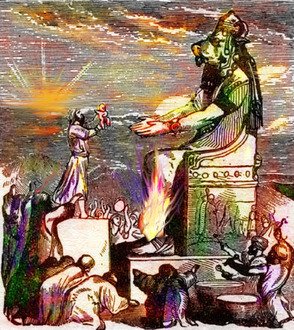

Cut or Uncut?
Recently two friends and I had an exchange of emails on circumcision.
Friend #1 sent us an article alleging that circumcision of infants might be harmful:
Circumcision Permanently alters the Brain
I replied be sending the two of them my article on Circumcision and some comments: "This is interesting. Thanks for sending it. God asked Abraham as an adult to circumcise himself, his sons Isaac and Ishmael, and the men in the camp. They were all adults and no pain killers were available. Very traumatic indeed. The practice continued for Jewish male babies on the 8th day after birth —for two thousand years until Jesus changed everything. There is no biblical reason now for mandating physical circumcision but folklore abounds. What people do not realize today is that real circumcision is an interior matter now and the physical act is really irrelevant. I remember back in the ‘40’s (I think) there was lots of debate pro and con which was unrelated to the real issue."
Friend #1 replied: "I agree with you. Circumcision, animal scarifies, ritual purification and etc, is subsumed by the once-for-all sacrifice of the perfect man Jesus Christ, the only right and perfect substitution. No acts of human effort can produce any salvation or righteousness before a holy God — who has shut up all in disobedience that He might sovereignly show mercy and grace to all who trust and keep themselves hidden in Him."
Friend #1 agreed with my conclusions while Friend #2 --who is uncut--shuddered. Under no circumstances did he want anyone to mutilate his body. I answered that Jesus had been circumcised on the eighth day and if this had been a mutilation Jesus would have been disqualified as the Lamb of God who took away the sins of the world. See: The Foreskin of Jesus. This fact should nullify claims that all circumcision is "genital mutilation." Circumcision of male babies on their eighth day of life is usually safe these days, still common not only among Jews but Gentiles as well. But the root meaning changed forever when Christ died on the cross.
As instituted with Abraham, circumcision was not a simple matter at all. It was to teach Abraham and his progeny that the one true God was holy and they were likewise were to be a holy nation. This was very clear when the Law of Moses and the Old Covenant sacrificial system was instituted en route from Egypt to the Promised Land under Moses (c.1450 BC). See Blood and Sex by Ray Stedman.
The rest of the ancient world after the Flood quickly became polytheistic. The descendants of Noah's grandson Ham were especially derelict with regard to sex. See: The Canaanites. They occupied the Promised Land and dragged everyone around into their permissive life styles. See The Meaning of Sodom, and Jerusalem: An Adulteress Woman, and How could a God of Love order the massacre/annihilation of the Canaanites? and Crackpots.
The downhill slide of Israel as these greatest nation in the ancient world came about because they bought into Canaanite religion. This is a separate discussion!
Today almost everything about God as a Person and His lofty Holiness is long forgotten. We gentiles are thoroughly pagan. The Jewish people are often characterized by their moral behavior in marriage and family life--in the externals of religion. All that is lacking is for them to discover that Yeshua is their Messiah and that He fulfills all the promises in the Law of Moses.
The religion of the Canaanites spread like a cancer after Abraham among the Jews after Abraham's day leading to the national downfall in 586 BC, and to their dispersion for 2000 years into captivity after their rejection of Yeshua and the destruction of the Second Temple in AD 70. See The Holiness Papers

Circumcision in the Old Testament
1. Circumcision Was Initiated by God with Abraham
The physical rite if circumcision itself seems to have been originated by God at one special stage in Abraham’s spiritual development.
Genesis 12 records the whole story of this man’s life as he journeyed from Ur in Southern Iraq where his whole family knew only the Babylonian moon god [Al Illah]. Abraham, responding to the call of the one true God, Yahweh Elohim, became the spiritual father of nations.
Genesis 17 gives us the full details of God prescribing circumcision for His people:
“When Abram was ninety-nine years old, the Lord appeared to Abram and said to him, “I am Almighty God; walk before Me and be blameless. And I will make My covenant between Me and you, and will multiply you exceedingly.” Then Abram fell on his face, and God talked with him, saying: “As for Me, behold, My covenant is with you, and you shall be a father of many nations.
“No longer shall your name be called Abram, but your name shall be Abraham; for I have made you a father of many nations. I will make you exceedingly fruitful; and I will make nations of you, and kings shall come from you. And I will establish My covenant between Me and you and your descendants after you in their generations, for an everlasting covenant, to be God to you and your descendants after you. Also I give to you and your descendants after you the land in which you are a stranger, all the land of Canaan, as an everlasting possession; and I will be their God.”
And God said to Abraham: “As for you, you shall keep My covenant, you and your descendants after you throughout their generations. This is My covenant which you shall keep, between Me and you and your descendants after you:
Every male child among you shall be circumcised; and you shall be circumcised in the flesh of your foreskins, and it shall be a sign of the covenant between Me and you. He who is eight days old among you shall be circumcised, every male child in your generations, he who is born in your house or bought with money from any foreigner who is not your descendant.
He who is born in your house and he who is bought with your money must be circumcised, and My covenant shall be in your flesh for an everlasting covenant. And the uncircumcised male child, who is not circumcised in the flesh of his foreskin, that person shall be cut off from his people; he has broken My covenant.”
Then God said to Abraham, “As for Sarai your wife, you shall not call her name Sarai, but Sarah shall be her name. And I will bless her and also give you a son by her; then I will bless her, and she shall be a mother of nations; kings of peoples shall be from her.”
Then Abraham fell on his face and laughed, and said in his heart, “Shall a child be born to a man who is one hundred years old? And shall Sarah, who is ninety years old, bear a child?”
And Abraham said to God, “Oh, that Ishmael might live before You!”
Then God said: “No, Sarah your wife shall bear you a son, and you shall call his name Isaac; I will establish My covenant with him for an everlasting covenant, and with his descendants after him. And as for Ishmael, I have heard you. Behold, I have blessed him, and will make him fruitful, and will multiply him exceedingly. He shall beget twelve princes, and I will make him a great nation. But My covenant I will establish with Isaac, whom Sarah shall bear to you at this set time next year.” Then He finished talking with him, and God went up from Abraham.
So Abraham took Ishmael his son, all who were born in his house and all who were bought with his money, every male among the men of Abraham’s house, and circumcised the flesh of their foreskins that very same day, as God had said to him.
Abraham was ninety-nine years old when he was circumcised in the flesh of his foreskin.
And Ishmael his son was thirteen years old when he was circumcised in the flesh of his foreskin.
That very same day Abraham was circumcised, and his son Ishmael; and all the men of his house, born in the house or bought with money from a foreigner, were circumcised with him.
Abraham, the father of the Jewish people, lived about 20 centuries before Jesus was born, so the notion that true circumcision was a matter of the heart was well known among the Jews.
From Ray Stedman:
What a strange thing this is -- the removal of the foreskin of the male procreative organ -- literally carving in the flesh the sign of God's Lordship! This is the great sign of Jewry, intended by God to be the mark of his possession, that they were God's instrument to use for blessing among the nations. It was placed upon this particular part of the body to indicate that they were to be physically separate from the other nations. The very organ by which that separation could be violated, bore upon it the mark of God's ownership.
As we read the course of Jewish history, we see how this mark, intended to be the sign of humility and instrumentality, became perverted into a mark of superiority and favoritism. Those who bore it began to look on others as "Gentile dogs" and to be self-righteous and proud over their supposed favored position before God. Thus the spirit of anti-Semitism which troubles the world so today was born of the spirit of anti-Gentilism which preceded it. This does not justify either, of course.
Now let us remember that what was physical and literal to Abraham is intended to have spiritual significance to us. In the New Testament, therefore, we no longer read of circumcision of the flesh but of the heart. The heart is the symbol of the soul -- the mind, emotions, and will, the whole personality. Every believer in Christ is to bear on his heart the sign of Christ's Lordship. The total personality is to be at his disposal. That is the Christian's circumcised life.
Many scholars feel that circumcision was the origin of the wedding ring. The act of circumcision was performed by a metal or stone knife which cut around the foreskin leaving a circular scar. So a man and woman, standing before someone who represents God, place a metal and/or stone ring upon each other's fingers, indicating that two hearts are giving themselves to each other.
This is the meaning of heart circumcision: The believer's heart is totally Christ's, to use as he wills -- all his emotions, mind, intellect, and will are dedicated and available, ready at the command of Jesus Christ to be used for his purposes. Paul says to the Philippians, "We are the circumcision, who worship God in the spirit, and rejoice in Christ Jesus, and have no confidence in the flesh," (Philippians 3:3 KJV). We are to have no reliance upon ourselves, but rely totally upon him. Every thought, every imagination, is brought into captivity to Christ. That is the circumcised life.
"Walk therefore before me, and be wholehearted, blameless." That will be a life of fruitfulness and blessing, a life that is well-pleasing to God, for it all springs from the realization that the God who lives within is El Shaddai, the God who is sufficient. --Ray Stedman, The Circumcised Life.
2. Circumcision was Affirmed to Moses Five Hundred Years After Abraham
Then the LORD spoke to Moses, saying,
“Speak to the children of Israel, saying: ‘If a woman has conceived, and borne a male child, then she shall be unclean seven days; as in the days of her customary impurity she shall be unclean.
‘And on the eighth day the flesh of his foreskin shall be circumcised.
‘She shall then continue in the blood of her purification thirty-three days. She shall not touch any hallowed thing, nor come into the sanctuary until the days of her purification are fulfilled.
‘But if she bears a female child, then she shall be unclean two weeks, as in her customary impurity, and she shall continue in the blood of her purification sixty-six days.
‘When the days of her purification are fulfilled, whether for a son or a daughter, she shall bring to the priest a lamb of the first year as a burnt offering, and a young pigeon or a turtledove as a sin offering, to the door of the tabernacle of meeting.
‘Then he shall offer it before the LORD, and make atonement for her. And she shall be clean from the flow of her blood. This is the law for her who has borne a male or a female.
‘And if she is not able to bring a lamb, then she may bring two turtledoves or two young pigeons—one as a burnt offering and the other as a sin offering. So the priest shall make atonement for her, and she will be clean.’ ” (Leviticus 12:1-8)


Then Jesus sent the multitude away and went into the house.
And His disciples came to Him, saying, “Explain to us the parable of the tares of the field.”
He answered and said to them: “He who sows the good seed is the Son of Man.
“The field is the world, the good seeds are the sons of the kingdom, but the tares are the sons of the wicked one.
“The enemy who sowed them is the devil, the harvest is the end of the age, and the reapers are the angels.
“Therefore as the tares are gathered and burned in the fire, so it will be at the end of this age.
“The Son of Man will send out His angels, and they will gather out of His kingdom all things that offend,
and those who practice lawlessness, “and will cast them into the furnace of fire.
There will be wailing and gnashing of teeth.
“Then the righteous will shine forth as the sun in the kingdom of their Father.
He who has ears to hear, let him hear.
(Matthew 13:37-43)
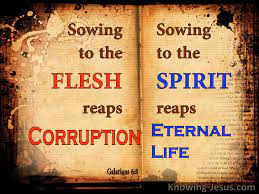

Supplemental Reading
Circumcision
The Canaanites
Deliberate Sin
Sexuality and Wholeness Papers
House of Cards
The Great Generational Disconnect
The Approaching Time of the End
The Left Hand of God
Earth's Near Term Future
The Management of the Universe
How Jesus Saves


 Lambert's Main Library
Lambert's Main Library
Email Lambert Dolphin
Archive for Newsletters
Library Annex (900+ new articles since 2018)
Help Thyself. No Charge.
Recent articles are at the bottom

Donations are Welcome

August 24, 2021
. September 27, 2023





 When Zipporah and her sisters spotted Moses the first time, they thought he was an Egyptian, and in many ways they were right. Moses had been in the household of Pharaoh in Egypt since infancy. His mannerisms and customs were shaped by his Egyptian upbringing. In fact, he most likely dreamt in the language of Pharaoh. Everything about him was Egyptian, except for one thing. Unlike his Egyptian peers, he was circumcised. Circumcision was not the same medical practice it is today, but circumcision was a sign of the covenant God had made with Abraham and his descendants. Zipporah had borne two sons to Moses, but he had failed to perform circumcision on his sons. Egypt had caused Moses to forget his roots—his identity—as a descendant of Abraham. Alas, he had forgotten his blood!
When Zipporah and her sisters spotted Moses the first time, they thought he was an Egyptian, and in many ways they were right. Moses had been in the household of Pharaoh in Egypt since infancy. His mannerisms and customs were shaped by his Egyptian upbringing. In fact, he most likely dreamt in the language of Pharaoh. Everything about him was Egyptian, except for one thing. Unlike his Egyptian peers, he was circumcised. Circumcision was not the same medical practice it is today, but circumcision was a sign of the covenant God had made with Abraham and his descendants. Zipporah had borne two sons to Moses, but he had failed to perform circumcision on his sons. Egypt had caused Moses to forget his roots—his identity—as a descendant of Abraham. Alas, he had forgotten his blood!
 1. As you therefore have received Christ Jesus the Lord, so walk in Him,
rooted and built up in Him and established in the faith, as you have been taught, abounding in it with thanksgiving.
Beware lest anyone cheat you through philosophy and empty deceit, according to the tradition of men, according to the basic principles of the world, and not according to Christ.
For in Him dwells all the fullness of the Godhead bodily;
and you are complete in Him, who is the head of all principality and power.
In Him you were also circumcised with the circumcision made without hands, by putting off the body of the sins of the flesh, by the circumcision of Christ,
buried with Him in baptism, in which you also were raised with Him through faith in the working of God, who raised Him from the dead.
And you, being dead in your trespasses and the uncircumcision of your flesh, He has made alive together with Him, having forgiven you all trespasses,
having wiped out the handwriting of requirements that was against us, which was contrary to us. And He has taken it out of the way, having nailed it to the cross.
Having disarmed principalities and powers, He made a public spectacle of them, triumphing over them in it.
For this you know, that no fornicator, unclean person, nor covetous man, who is an idolater, has any inheritance in the kingdom of Christ and God.
Let no one deceive you with empty words, for because of these things the wrath of God comes upon the sons of disobedience.
Therefore do not be partakers with them. (Colossians 2:6-16)
1. As you therefore have received Christ Jesus the Lord, so walk in Him,
rooted and built up in Him and established in the faith, as you have been taught, abounding in it with thanksgiving.
Beware lest anyone cheat you through philosophy and empty deceit, according to the tradition of men, according to the basic principles of the world, and not according to Christ.
For in Him dwells all the fullness of the Godhead bodily;
and you are complete in Him, who is the head of all principality and power.
In Him you were also circumcised with the circumcision made without hands, by putting off the body of the sins of the flesh, by the circumcision of Christ,
buried with Him in baptism, in which you also were raised with Him through faith in the working of God, who raised Him from the dead.
And you, being dead in your trespasses and the uncircumcision of your flesh, He has made alive together with Him, having forgiven you all trespasses,
having wiped out the handwriting of requirements that was against us, which was contrary to us. And He has taken it out of the way, having nailed it to the cross.
Having disarmed principalities and powers, He made a public spectacle of them, triumphing over them in it.
For this you know, that no fornicator, unclean person, nor covetous man, who is an idolater, has any inheritance in the kingdom of Christ and God.
Let no one deceive you with empty words, for because of these things the wrath of God comes upon the sons of disobedience.
Therefore do not be partakers with them. (Colossians 2:6-16) The idea of “circumcision of the heart” is found in Romans 2:29. It refers to having a pure heart, separated unto God. Paul writes, “A Jew is one inwardly, and circumcision is a matter of the heart, by the Spirit, not by the letter.” These words conclude a sometimes confusing passage of Scripture regarding circumcision and the Christian. Verses 25-29 provide context:
The idea of “circumcision of the heart” is found in Romans 2:29. It refers to having a pure heart, separated unto God. Paul writes, “A Jew is one inwardly, and circumcision is a matter of the heart, by the Spirit, not by the letter.” These words conclude a sometimes confusing passage of Scripture regarding circumcision and the Christian. Verses 25-29 provide context: Ray Stedman adds: "...The Apostle closes on one of the most personal notes in the whole New Testament. He says (verse 11):
See with what large letters I am writing to you with my own hand. (Galatians 6:11 RSV)
Painfully scratching it, hampered by poor eyesight, he says, "I don't want to glory in your flesh like these Judaizers do. They love to compel people to be circumcised because they think each person circumcised is another scalp they can hang on their belts as a sign that they have done something tremendous for God. That is not my glory." He says, "I glory in the cross of Christ which cuts off that kind of living, cuts it right off a the roots, cuts off the 'old man' with all his self-seeking, ambition, and self glory. The cross of our Lord Jesus Christ which crucifies me unto the world and the world unto me -- that is my glory." Now he says, "Don't any of you write to me and tell me that what I have written you is all wrong, because I want you to know that living this kind of life has been costly. I have earned the persecution of many. I bear in my body the marks of the Lord Jesus."
Ray Stedman adds: "...The Apostle closes on one of the most personal notes in the whole New Testament. He says (verse 11):
See with what large letters I am writing to you with my own hand. (Galatians 6:11 RSV)
Painfully scratching it, hampered by poor eyesight, he says, "I don't want to glory in your flesh like these Judaizers do. They love to compel people to be circumcised because they think each person circumcised is another scalp they can hang on their belts as a sign that they have done something tremendous for God. That is not my glory." He says, "I glory in the cross of Christ which cuts off that kind of living, cuts it right off a the roots, cuts off the 'old man' with all his self-seeking, ambition, and self glory. The cross of our Lord Jesus Christ which crucifies me unto the world and the world unto me -- that is my glory." Now he says, "Don't any of you write to me and tell me that what I have written you is all wrong, because I want you to know that living this kind of life has been costly. I have earned the persecution of many. I bear in my body the marks of the Lord Jesus."




 Lambert's Main Library
Lambert's Main Library 
